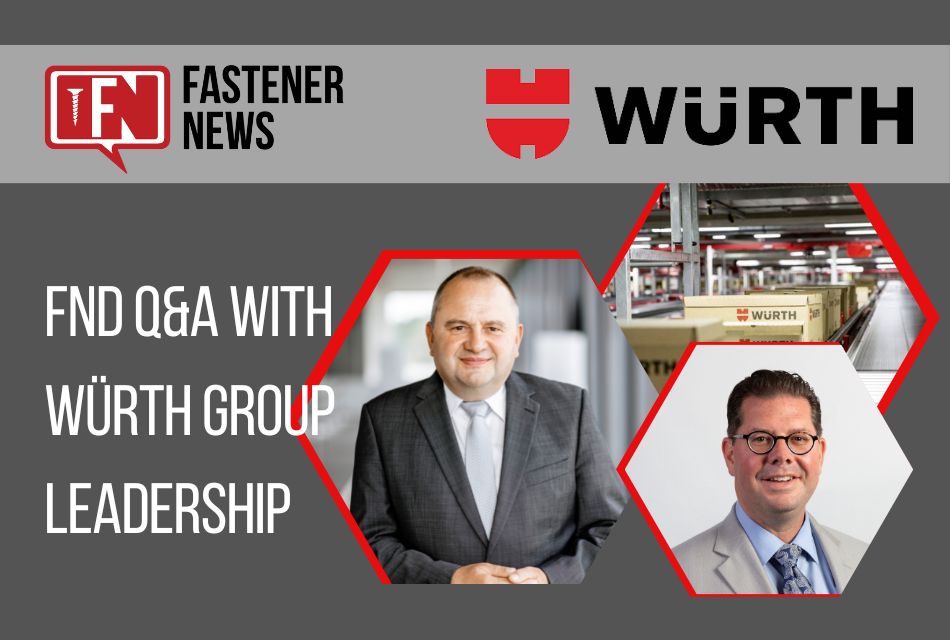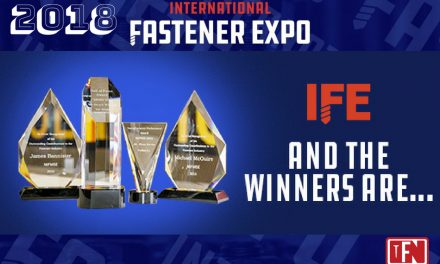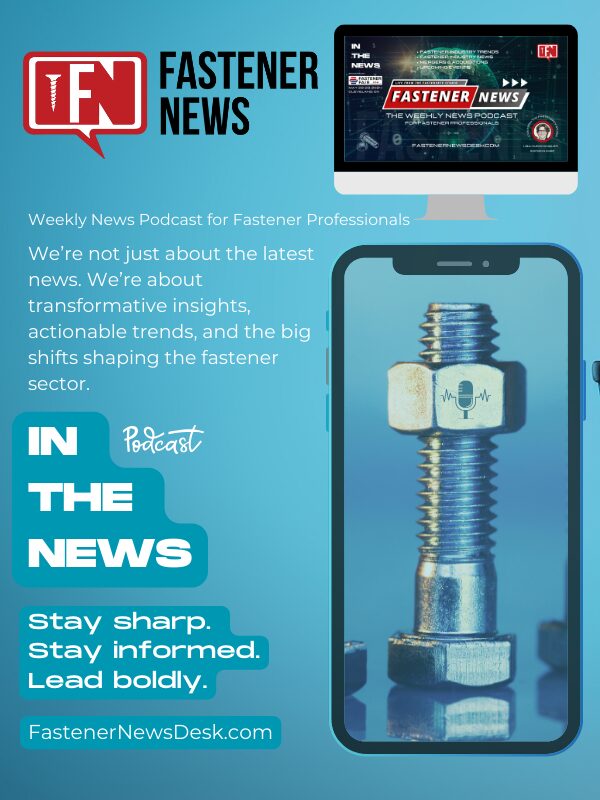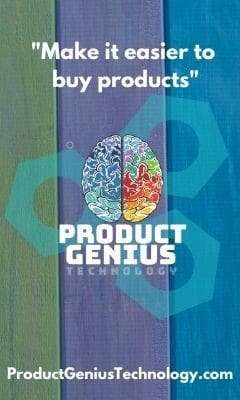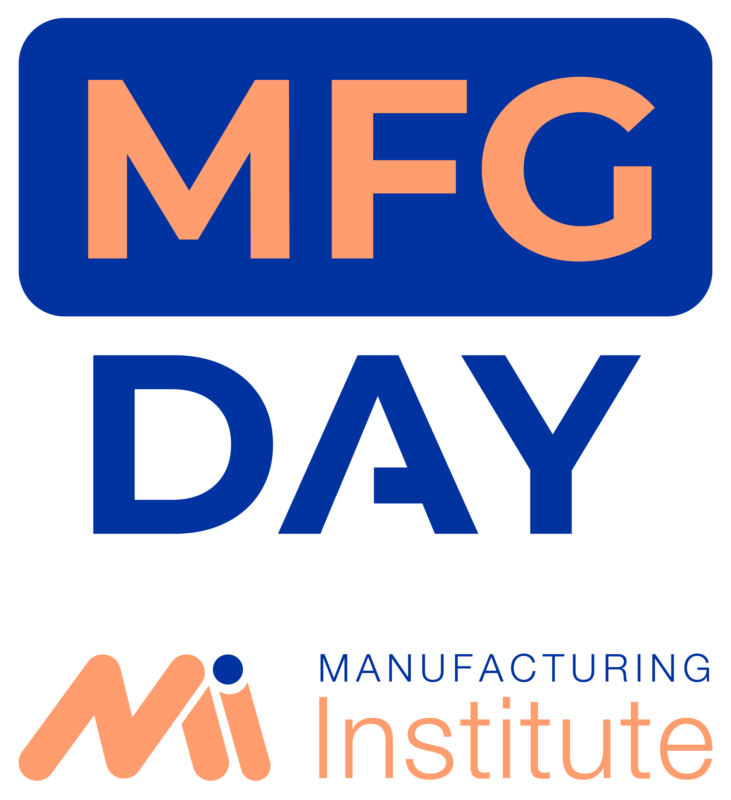
Fresh off a week-long U.S tour with Bettina Würth, Chairwoman of the Advisory Board of the Würth Group, and Sebastian Würth, Member of the Advisory Board of the Würth Group, we sat down with Dan Hill, CEO, Würth Industry North America & Executive Vice President of the Würth Group, and Rainer Bürkert, Member of the Central Managing Board of the Würth Group in their first ever joint interview to discuss the success of the business—including sales and employee growth in 2022—, the future of the fastener industry, and why Würth is the place to be when it comes to growing your career.
Their tour included stops in five states, visiting six Würth Industry North America locations, meeting with leadership at five of their strategic customers’ facilities, and addressing over 300 members of the WINA team after a two-plus year hiatus from travel to the U.S.

Würth Construction Services Leadership Team: Bettina Würth, Sebastian Würth, Rainer Bürkert, Dan Hill, Alex Mikros, CEO, Würth Construction Services, and other division leadership at the Hicksville, NY headquarters.
FND: Hello, gentlemen; thank you for the opportunity to speak with you both, you’ve clearly had a very busy past week. Please introduce yourselves to our audience.

Dan Hill, CEO, Würth Industry North America & Executive Vice President of the Würth Group
Dan Hill: Hello, I’m Dan Hill, and I am the Chief Executive Officer for Würth Industry North America. I also serve as Executive Vice President of the Würth Group with responsibility for North and South America – I’m one of twenty EVPs that help manage our $24 billion business. I’ll be completing my fourth year with the Würth Group this fall. It’s a great opportunity, a great company to work for, and as you saw last week, we had a chance to host Bettina Würth and Sebastian Würth, and my colleague Rainer Bürkert. As he’ll share with you, Rainer is on the Central Managing Board of the Würth Group. I work for Rainer directly, so anytime we have an opportunity to have his type of leadership and experiences inside the United States, we welcome that! With that, I’ll turn it over to Rainer.

Rainer Bürkert, Member of the Central Managing Board of the Würth Group
Rainer Bürkert: Thank you, Dan. My name is Rainer Bürkert, and I have worked for the Würth Group for 31 years. I am now a member of the Central Managing Board, which consists of five people who lead the strategic development of the group. I started my career at Würth in the internal auditing department, and since then, I have been in the M&A department, responsible for the sales force of the Industry division, and then step by step going up the career ladder until serving on the Central Managing Board.
FND: Thank you for being here. It’s an honor to have the rare opportunity to speak with you both. Rainer, your career path should serve as an inspiration to all young people looking for a career in the fastener industry. Thirty-one years of leadership and commitment…we can’t wait to hear your thoughts on the future of the fastener industry and digital distribution.
FND: It has recently been reported that Würth’s sales rose by 18.4% in the first half of 2022, and Würth has continued an upward growth trajectory through the pandemic. What can you attribute this to?
Rainer Bürkert: There are several points: first, we have always taken care to make sure that we have sufficient inventory on hand for our customers, and so we have been able to ride the wave of supply chain issues well. Second, all our customers know that we are a financially stable operation. In these uncertain times, financial stability is a key factor in the fastener industry. Often, we will supply 10 to 15 thousand articles to customers working with us, and they are not able to change suppliers from one day to the next. Even if these are small parts, they would have a problem if their suppliers struggled, and so they need a financially stable supplier. This is what Würth guarantees with an equity ratio of 46%.
Another main point contributing to our growth is our culture. Even in the crisis of 2009, the Würth group clearly stated that we would not lay off colleagues, so we held true to that promise as people are the core success factor of our business. There is a lot of long-term knowledge within our sales force and within our internal workforce – therefore, from employees’ first day, they know that no matter what happens, the last thing we will do is lay people off. This gave us the advantage that when things became unstable when customers from one day to the next had the need to scale up their production, scale down, or whatever was needed at this time – we had sufficient knowledge and experience on board to support them. When you support customers in difficult times, they will support you when times become better.
FND: We all adopted to connecting digitally during the pandemic, but nothing really compares to human interaction and being able to work together. We understand that you have been traveling in the U.S. with Bettina Würth and Sebastian Würth, and of course, Dan Hill. Can you tell us what the sentiments were amongst your team with the ability to finally travel safely to the United States and get back to normal business operations now that some of the COVID restrictions are beginning to ease?
Rainer Bürkert: It is like coming back into a world…into a lost world, I would say. When you’ve been caged for two or more years, you must learn how to manage things exclusively digitally. You think everything has worked out digitally, but when you, for the first time, shake hands with your colleagues when you have dinner with them, it then becomes pretty clear how important it is that from time to time, you round up everyone to say thank you for what they did during COVID times. A huge thank you to the warehouse teams, as they had no chance to work from home. Saying thank you is a large part of our culture. We are not stock price or private equity-driven. We are a family company, and we want to be able to express what being a family is about – taking care of everybody.
FND: During your recent travels to the United States, your team visited several manufacturing and construction facilities as part of the U.S. tour. What would you say were some common concerns for businesses? Supply chain, price instability, inflation, workforce, were there others that you heard out there, and also what business trends did you notice in your visits?

Customer Visit Austal: Rainer Bürkert, Dan Hill, Eric Wilk, CEO, Würth MRO, Safety, & Metalworking, and team members visited Austal USA in Mobile, AL, one of the divisions’ shipbuilding customers of 13 years.

Customer Visit Daikin: Rainer Bürkert, Dan Hill, Jim Johnson, CEO, Würth Industrial Division, and other division leaders visited Daikin Comfort Technologies in Waller, TX, a seven-year customer of the Industrial division.
Rainer Bürkert: Without any question, all the topics you mentioned are also causing trouble for our customers, but you can see in general that business is going well. Businesses are restarting after the pandemic, and some of the supply chain issues are easing, even though they are not completely gone. All our customers, in general, have clearly stated that they are facing workforce shortages. It is becoming important to work in a closer way together to reduce unnecessary processes that will allow us to gain productivity on both sides. Therefore, we, as Würth, offer the right solutions with our digitalization and systems like Kanban and EDI connection; we have the right cards on hand to talk to them in this critical time. We can no longer just talk about the price of one bolt or one nut; we must talk about processes – how to bring the right product in the right quality at the right time to the right place of usage with a total cost of ownership as low as possible.
This is what the industry is talking about; therefore, I think we can prove, especially with our global footprint, including Europe and Asia, that Würth is able to do this. You ask large customers in this industry, and the decision-makers don’t want to need to have talks in each and every country around the world with multiple fastener suppliers. They want to have one agreement, one general quality policy, and so on. They want to have someone they can rely on, one point of interaction, and this is what the Würth Group is offering with our Würth Industry Network with more than 80 companies around the globe having the same technology backbone and article numbers and able to exchange inventory and data. Data is critical. Often our customers do not know if the information they have on their computers is exactly what the usage is at the production line where their people work. They need a partner like Würth with a strong backbone of engineers to help them in engineering capacities to drive forward a common database. These are all topics with those customers we visited, so we can say after this visit that we have the medicine our customers are asking for.
FND: As we’re witnessing here in the United States and in Europe as well, temperatures are rising, issues concerning climate change cannot be put aside any longer. Würth has taken a leading role concerning sustainability in its European facilities. Will we see this expand to the United States?
Rainer Bürkert: It is already expanding to the United States. Perhaps you will have read that in Europe more than 40% of our energy we produce by ourselves via wind power, water driven electricity and so on. This is also expanding to the United States because we not only have the responsibility for our environment for sustainability, but this is also economically driven because the energy produced by photovoltaics (solar energy) is cheaper than energy produced by consuming oil or gas. Even so, oil and gas are very important resources for the future of mankind to make things like medicines or plastics. Only burning them is, in my opinion, not the most intelligent way. It’s up to us as a family company to show how we can be the best in class and how to do it without a huge carbon footprint. It’s pretty clear we cannot change everything in one year, but our clear target is to become carbon neutral also here in the United States.
FND: Congratulations to Würth on the opening of your new state-of-the-art distribution center in Roanoke, VA. Do you foresee the warehouse consolidation in other Würth branches based on some new technologies and capabilities at your new facility?

Würth Revcar Industrial Division Roanoke HQ: Bettina Würth, Sebastian Würth, Rainer Bürkert, and Dan Hill at the new 387,558 square foot central distribution center in Roanoke, Va.

Würth Revcar Industrial Division Roanoke Team: Bettina Würth, Sebastian Würth, Rainer Bürkert, Dan Hill, Chapman Revercomb, CEO, Würth Revcar – Industrial Division, and the Roanoke, VA team.
Rainer Bürkert: It’s not mainly about warehouse consolidations. It’s more about customer-centric logistics. This new warehouse will give us the ability for bigger customers to bring their articles together.
We also want to walk towards automatization. Earlier, we touched on the labor shortage, and we cannot allow using the workforce we do have on hand handling bolts and nuts in an old-fashioned way. We want to modernize this without reducing the workforce – everybody who has a job with us will continue to have one because we grow into the future. We have grown throughout our full history by double digits, and this is also our plan for the future creating new jobs.
FND: In your new facility in Roanoke, is there an engineering department on hand? Will this part of the new distribution center be working on specialty products?
Rainer Bürkert: There is an engineering center there, absolutely. They are not only concentrating on special products, but they will also be standard parts. We want to ship one shipment for one customer, not dragging together articles from different warehouses. We want to show the customer also – and this relates to carbon footprint – that there is only one truck going to the customer. We increase productivity this way, and we also have the chance to do more modern and digitalized processes.
FND: We’ll be looking forward to the grand opening of the new Würth state-of-the-art distribution center.
Rainer Bürkert: Next March will be the grand opening, and then perhaps you can be there.
FND: We would love to! Absolutely I’ll personally drive to get there, no problem.
FND: As the world’s largest fastener company, what are your thoughts on the industry’s growth potential?
Rainer Bürkert: Having done this a trip here to the United States and having driven through many industrial parks – the growth opportunities are unbelievable. We have not even scratched the surface of this market.
FND: Wow, that’s so good to hear. That’s great. I think you’re right that there’s a lot of potential out there. So, moving into the future, does Würth anticipate a continued growth strategy through acquisitions, technology investments, or a combination?
Rainer Bürkert: Without any question, a combination. We are driving organic growth by increasing the article range with our current customers. When you look at our global industry headquarters in Bad Mergentheim, Germany, we deliver each year between 1.4-1.5 million different articles to our customers from very different product ranges. We’re not talking about articles only; we’re talking about processes. Customers are relying on us to be the best in class in supply chain management solutions, and when we start with fasteners step-by-step, they hand us over other C-part articles. This is the path to organic growth. If you start with the customers with $100,000 in fasteners with this path, you can end up in $2-3 million in sales only by adding articles to that supply chain management concept. So, this is the first way we want to grow.
The second way, without any question, is gaining new customers. When you make customers enthusiastic about your service, they will be the best salesman for you because managers know each other and talk to each other. When they hear there is a supplier you can trust and rely on, this will give you the opportunity to expand to new customers. With each and every new customer, there’s a growth opportunity.
Last but not least, Würth is again a very financially stable company, and we have grown in the past by acquiring companies. Out of the 450 active companies in the group, we have acquired over half of them very successfully. We do not act like a private equity company, so when we buy a company, we go into the future with those companies. We want to grow with them long-term. We want to be successful with them, and so acquisition clearly is a pillar in our growth strategy.
FND: How important is your online presence to your digital growth strategy?
Rainer Bürkert: It’s becoming more and more important because with each and every day, purchasing managers go to retire, and the new ones coming up have grown up as digital natives, so times are changing. We will do everything to be at the front of this development to give all means to our companies to develop ahead of the curve. It will not be about black or white, so not everything is digitalized, or everything is non-digitalized, but it’s a combination. There are multiple contact points you will have with the customers: systems like Kanban, data to be worked, and engineering, but there is also the digitalization where you can run discrete orders. Every day something happens which is unexpected, and then our customers will fall back on Würth no matter the mode of communication.
FND: Würth is a great example of a digitally ready company. How will you continue to lead the industry and it digitally driven era?
Rainer Bürkert: When we talk about digitalization, it’s not just the United States or Europe. We also have a big footprint in India, where software engineers are sitting and working on developing those means of digitalization. Yes, it’s a little different at the front end in China or in Vietnam, but at the back end, organizing an order, where it comes, quality assurance, etc. – all around the globe, this is mainly the same. This is what our customers are asking for: that they can look today at what their factory is doing in Gainesville and what their factory is doing in Japan without having huge processes to get the information. They can fall onto our network structures and get all the data and statistics from us because this is much easier. Our customers are very lucky that they can fall back on our systems for handling these parts without having the need to use their own resources.
FND: 3D printing/additive manufacturing is getting attention as a viable manufacturing business process and Würth already has established its own division, Würth Additive. What impact do you see this technology having for fastener distributors?
Rainer Bürkert: Again, it is not black or white, but this technology has the potential to change parts of the industry. Perhaps today, we have the ability to print 0.2% of all the products we deliver. It’s not a big percentage, but what comes in the future is unknown. Technology is developing so rapidly that perhaps in five or ten years, this technology will become critical for our customers and for us. We want to be the front runner in this by using and learning about this key technology. We are on a steep learning curve together with our customers. What will the market be? Where can this technology lead us? What will be our role? Nobody knows what the end of the story will be, so the most important is that we are part of the story.
FND: The fastener industry faces several changes due to attrition, private equity buyouts, technology, and lack of a skilled workforce. What strategy does Würth see as a viable path to finding individuals interested in a career path within the fastener industry?
Rainer Bürkert: The most important offering hiring companies can make is that they are growing. When you work in a growing environment, the chance of having a good and sustainable career is best. It is much more difficult to build a career at a stagnant company. Würth is continuing our growth story. This is what I would tell young people. We do a lot of initiatives around the globe for training, internships, practicums, and career advancement. We give many employees the possibility to work for a few years in Asia or in Europe or wherever to give them a broader skill set. We have our own academies, universities, and teachers and trainers. We also have mentoring programs for young people to give them support in the startup phase of their careers. Würth is also focusing on diversity, helping each and every group of our workforce so that they have a fair chance to grow their careers, and I think this shows young people that we are a great workplace. We also want to become the most sustainable company in this industry because this is quite important for young people when they make their decision about where they want to work in the future. Altogether this setup is hopefully giving us the chance to attract a lot of young, intelligent talents to join us, and we all know that those will become the best colleagues who will achieve the best results.
FND: Fantastic it really sounds like Würth is the place to be. I tell you that for just so many reasons; the culture, the innovativeness, the automation processes, the growth that the company is experiencing. Congratulations and kudos to Würth for all that they do for this industry and for the people within it!
About Würth Industry North America
Würth Industry North America (WINA) is a $1 billion division of the Würth Group, the world’s largest fastener distribution company. As a part of the Würth Group, founded in 1945, WINA is a privately held, family-owned business that believes collaboration and partnerships make better business. They have strategically aligned vertical market divisions: Industrial, MRO/Safety/Metalworking, Construction, and Specialty Markets, consisting of more than 110 locations across North America that allow industries to have better planning, parts management, and inventory accuracy. As industry solution drivers, WINA works together onsite by offering products and services such as 3D printing and additive services, digital Kanban, construction services, engineering assistance, quality control, inventory management, vending, safety supplies, kitting and assembly,
structural fasteners, and MRO/industrial supplies. With over 420,000 parts in their international supply chain, WINA not only provides each customer with an extensive global reach but also a local feel from a deep investment in an ever-expanding network of North American locations across the United States, Canada, and
Mexico. For more information on Würth Industry North America and a complete list of companies and locations, go to
wurthindustry.com.
RELATED CONTENT:
Würth Revcar Leases Former Home Shopping Network Building in Roanoke, VA
Digital Transformation, Distribution, Fasteners




